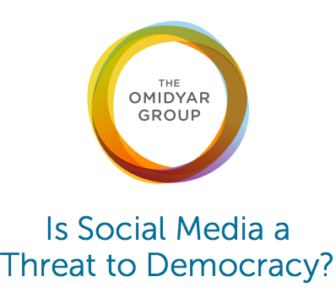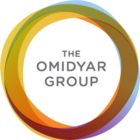 Editor’s Note: Earlier this month, the Omidyar Network and the Democracy Fund released a report examining six key issues presented by social media participation and manipulation. The paper, they noted, “was inspired because the current instability in democracies — caused in part by increasing political polarization, the trust deficit vis-à-vis institutions and elites and the spread of mis-and disinformation across the globe — is causing potentially irrevocable harm to fundamental rights.” Below is an excerpt from the report.
Editor’s Note: Earlier this month, the Omidyar Network and the Democracy Fund released a report examining six key issues presented by social media participation and manipulation. The paper, they noted, “was inspired because the current instability in democracies — caused in part by increasing political polarization, the trust deficit vis-à-vis institutions and elites and the spread of mis-and disinformation across the globe — is causing potentially irrevocable harm to fundamental rights.” Below is an excerpt from the report.
It is becoming increasingly apparent that fundamental principles underlying democracy — trust, informed dialogue, a shared sense of reality, mutual consent and participation — are being put to the test by certain features and attributes of social media. As technology companies increasingly achieve financial success by monetizing public attention, it is worth examining some of the key issues and unintended consequences arising as a result.
Given the focus of this paper, we have not addressed any of the negative individual, psychological, ramifications of social media, such as its effects on depression, addiction, coercion, exhibitionism, self-censorship and other “chilling effects.”

By any meaningful measure, the category we refer to as “social media” today encompasses massive scale. These platforms are pervasive, and fully and effectively integrated into the public discourse and lives of individuals. By 2017, for example, Facebook-owned platforms already reach 86% of internet users aged 16 to 64 in 33 countries and effectively act as the gateway to the internet, if not the internet itself.
In a sense, Facebook is becoming the world’s largest news source; 44% of people across 26 countries surveyed say they use it for news. Similarly, Pew’s analysis shows that in the U.S., two-thirds of Facebook users (66%) get news on the site, nearly six out of ten Twitter users (59%) get news on Twitter, and, highest, 70% of Reddit users get news on that platform. Similar trends exist for 18-to 24-year-olds and users in emerging economies such as the Philippines and Myanmar.
Facebook has boasted about the amount of a user’s daily attention it captures, and as we learn more about the new “attention economy,” this issue is mission critical. Google has already commoditized search, email, storage and arguably, information — in many instances, disrupting economies and longstanding arrangements. The advantage social media platforms such as Facebook and Google have in monetizing attention accrues from their unprecedented and large-scale collection and analysis of personal data. Less sanguine is the use of behavioral and psychographic profiling, which can be harvested to deliver personalized content and advertising — much of which is unregulated and invisible to all but the recipient.
It could be argued that this exceptionally clear line to monetization dominates their operating logic, their community architecture and their decision-making. The business model is simple: capture attention, then monetize it through advertising. However, the effects of social media on public discourse, civility and fact-based debate — given the massive scale — necessitate increased attention to its impact on democracy. The early optimism about social media’s potential for democratizing access to information, and giving voice to those who were traditionally marginalized or censored, is eroding.
Indeed, as social media platforms have grown, they have been accused of:
- Exacerbating the polarization of civil society via echo chambers and filter bubbles
- Rapidly spreading mis-and disinformation and amplifying the populist and illiberal wave across the globe
- Creating competing realities driven by their algorithms’ intertwining of popularity and legitimacy
- Being vulnerable to political capture and voter manipulation through enabling malevolent actors to spread disinformation and covertly influence public opinion
- Capturing unprecedented amounts of data that can be used to manipulate user behavior
- Facilitating hate speech, public humiliation and the targeted marginalization of disadvantaged or minority voices
Six Key Risks
Though there are a number of different ways to analyze the risks that social media poses for democracy, here we focus on six key issues at the core of the discussion
Echo Chambers, Polarization and Hyper-Partisanship
Social media platform design, combined with the proliferation of partisan media in traditional channels, has exacerbated political divisions and polarization. Additionally, some social media algorithms reinforce divisions and create echo chambers that perpetuate increasingly extreme or biased views over time.
Spread of False and/or Misleading Information
Today, social media acts as an accelerant, and an at-scale content platform and distribution channel, for both viral “dis”-information (the deliberate creation and sharing of information known to be false) and “mis”-information (the inadvertent sharing of false information). These two types of content — sometimes mistakenly conflated into the term “fake news” — are created and disseminated by both state and private actors, in many cases using bots. Each type poses distinct threats for public dialogue by flooding the public square with multiple, competing realities and exacerbating the lack of agreement about what constitutes truth, facts and evidence.
Conversion of Popularity into Legitimacy
The algorithms behind social media platforms convert popularity into legitimacy, overwhelming the public square with multiple, conflicting assertions. In addition, some social media platforms assume user intentionality (e.g. in search queries) and conflate this with interest, via features such as auto-fill search terms. These design mechanisms impute or impose certain ways of thinking, while also further blurring the lines between specialists and laypeople, or between verified and unverified assertions, thus contributing to the already reduced trust in traditional gatekeepers.
Manipulation by “Populist” leaders, Governments, and Fringe Actors
“Populist” leaders use these platforms, often aided by trolls, “hackers for hire” and bots, on open networks such as Twitter and YouTube. Sometimes they are seeking to communicate directly with their electorate. In using such platforms, they subvert established protocol, shut down dissent, marginalize minority voices, project soft power across borders, normalize hateful views, showcase false momentum for their views, or create the impression of tacit approval of their appeals to extremism. And they are not the only actors attempting to use these platforms to manipulate political opinion — such activity is now acknowledged by governments of democratic countries (like the UK), as well.
Personal Data Capture and Targeted Messaging/Advertising
Social media platforms have become a preferred channel for advertising spend. Not only does this monetization model drive businesses reliant on the capture and manipulation of huge swathes of user data and attention, it also widens the gap between the interests of publishers and journalists and erodes traditional news organizations’ revenues. The resulting financial strain has left news organizations financially depleted and has reduced their ability to produce quality news and hold the powerful to account. In addition, advanced methods for capturing personal data have led to sophisticated psychographic analysis, behavioral profiling, and micro-targeting of individuals to influence their actions via so-called “dark ads.”
Disruption of the Public Square
Some social media platforms have user policies and technical features that enable unintended consequences, like hate speech, terrorist appeals and racial and sexual harassment, thus encouraging uncivil debate. This can lead members of frequently targeted groups — such as women and minorities — to self-censor or opt out of participating in public discourse. Currently, there are few options for redress. At the same time, platforms are faced with complex legal and operational challenges with respect to determining how they will manage speech, a task made all the more difficult since norms vary widely by geographic and cultural context.
We look forward to continued sense-making and exploring possibilities to partner with others as we search for answers. Please email the authors at inquiries@omidyargroup.com if you’d like to discuss how we might work together.

The report “Is Social Media a Threat to Democracy” was originally posted on the Omidyar Network website. This excerpt is posted here with its permission. Note: The Omidyar Network is a financial supporter of the Global Investigative Journalism Network.
Anamitra Deb, director of the Omidyar Network; Stacy Donohue, an investment partner of the Omidyar Network; and Tom Glaisyer, program director for the Democracy Fund, contributed to this report. The Omidyar Network and the Democracy Fund are part of the Omidyar Group, a collection of companies, organizations and initiatives that strive to catalyze social impact by empowering individuals to create and sustain healthy societies.
